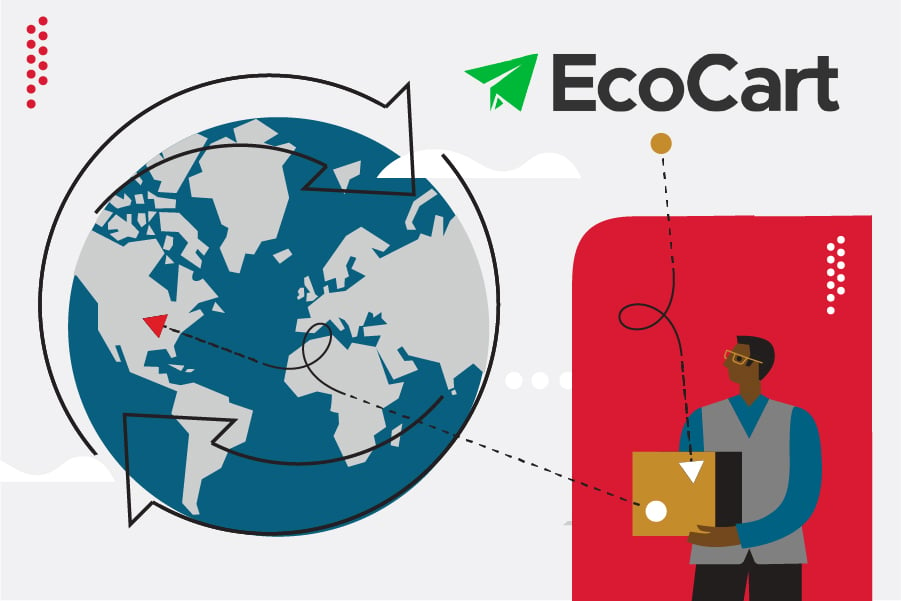Logistics
Warehousing & Fulfillment
Transportation
E-commerce
E-commerce Fulfillment Services
Lease & Maintenance
Semi Trucks
Supply Chain Technology
Logistics
E-commerce
Lease & Maintenance
Buy Used Trucks

This article is an excerpt from our latest e-book “Turning the page: Preparing for the Next Frontier of E-commerce” written by Ecocart, an e-commerce checkout plugin that facilitates one-click carbon offsetting.
In an age where climate change has become an undeniable global crisis, consumers are increasingly conscious of their environmental footprint. As a result, sustainability has emerged as a pivotal customer focus in e-commerce.
More and more, brands are now recognizing the importance of aligning their values with those of their sustainably-minded customers. This shift towards sustainability not only benefits the planet but also presents a golden opportunity for brands to engage their consumers and foster loyalty through shared values and planet-friendly practices.
But how do brands begin this shift? The answer is transparency.
Customers want to know what a brand is doing to reduce its carbon footprint, minimize waste, and incorporate ethical practices throughout its supply chain. By openly sharing their sustainability efforts across the customer experience, brands can build trust with their community. Leveraging various communication channels, including social media, email marketing, and their website, helps customers to feel informed and connected to their sustainability journey. When customers feel confident and knowledgeable about a brand’s initiatives, mutual trust, and loyalty are fostered between the consumer and the brand.
Customers who believe in a brand's commitment to sustainability are more likely to become repeat buyers. Many brands are recognizing this and are incorporating sustainability into their loyalty programs.
We’ve seen brands find success in providing rewards for sustainable action. Some initiative ideas include:
Such initiatives not only incentivize environmentally friendly behavior but allow brands to connect with their consumers’ values. This keeps them engaged with the brand, ultimately driving repeat business.
For brands to ensure sustainability is at their core, they must weave eco-conscious storytelling into their marketing strategies. While having a quick blurb or a sustainability page on their website is a great start, sustainability is harnessed most effectively in an omnichannel approach. Our favorite strategies are:
Brands can create compelling narratives around their sustainability journey. These stories can feature the people behind the brand, the communities they support, and the positive impact of their initiatives. Sharing these stories on socials, emails, or SMS texts is a great way to spread the word about how you’re making an impact.
Content marketing is a powerful tool for educating customers about sustainability. Brands can create blog posts, videos, and infographics that highlight environmental issues and solutions, positioning themselves as thought leaders in their field.
Partnering with environmental influencers or organizations can help amplify a brand's sustainability message. These collaborations can include joint campaigns, events, or product launches that promote shared values.
Clearly labeling products with their sustainability features or certifications, such as recycled materials or energy-efficient manufacturing, helps consumers make informed choices.
Encouraging customers to share their own sustainability efforts and experiences with the brand can create a sense of community and authenticity.
All of these above strategies are a great way to communicate goals and initiatives to customers, but the most important thing is having the backbone of sustainability in your supply chain and manufacturing.
Utilizing easy-to-download tools like EcoCart to offset customer shipments, is a great way to get started in what can be a very overwhelming process. Next, conduct a LifeCycle Analysis of your supply chain to see where your carbon footprint is the biggest. Once you know where the issues lie then you can expand into greater foundational changes like partnering with a new factory that is held to high labor expectations, finding a new sustainable material to make your product out of, or even using a biodegradable packaging option.
Take your customer on this journey with you and communicate what your goals for the year are and how you’ll be expanding sustainability across the entire supply chain. It’s a great way to build trust with your customers and create a process for accountability.
The e-commerce landscape is undergoing a profound transformation driven by customer’s focus on sustainability. Brands that embrace this change and authentically incorporate sustainable practices into their identity and marketing strategies are poised to not only engage their consumers but also build long-lasting loyalty through shared values and eco-conscious practices.
In our final e-book for this year, we’re diving into what e-commerce businesses should be thinking about as we turn the page and head into 2024. Ryder and a handful of our top partners are bringing clarity to an uncertain landscape where recession is looming and customer retention has never mattered more. Click here to download Turning the page: Preparing for the Next Frontier of E-commerce.